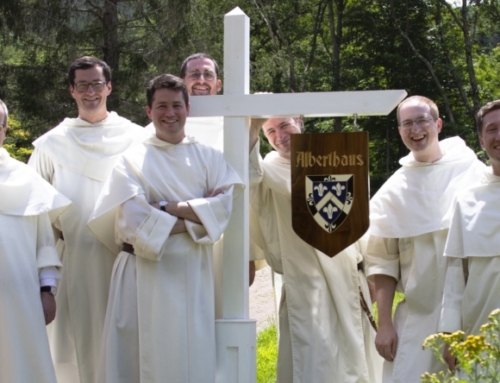I will admit that when I first heard that Pope Benedict XVI was joining the tweeting masses, I felt like Nathaniel in the Gospel of John: “Twitter? Can anything good come out of Twitter?” Why, I wondered, was the Holy Father persuaded to join the endlessly vapid, emotionally incontinent primal scream that passes for our global online discourse? Does this mean that every Fr. Tom, Dick, and Harry will feel compelled to contribute to our national attention deficit disorder with homilettes in 140 characters or less? Heaven forfend.
After getting a tighter grip on my horses—it was finals week, after all, and wading through the imponderables of metaphysics can put anybody in a bad mood—I considered the question a bit further, and came to the precise opposite conclusion. Not only is it a good thing for the Pope to be on Twitter, but more of us should think about social media as a vital venue for the New Evangelization.
How did this rather reactionary luddite change his mind so quickly? Well, it was for exactly the same reasons that I was so skeptical initially. Namely:
•Much of the Internet is a sea of filth.
•Too many use online social networks as an alternative to real community.
•These venues are filled with people profoundly hostile to all the Church stands for.
•This kind of discourse just seems beneath us.
It may not read like a manifesto for the technological apostolate, but it is precisely that.
To be sure, surfing the Net can be more like wading through toxic sludge than quaffing the pure waters of truth. The explosion of online pornography has had a far greater impact on our culture than we have yet realized. Yet even aside from pornography, the Internet is filled with content that ranges from the mindlessly banal to the morally dubious to the shockingly violent and depraved.
Why wade into this cultural wasteland? For the same reason that St. Paul strode up the Areopagus in Athens—because “where sin abounded, grace did much more abound” (Rm 5:20). As Christians, we must venture into the public square no matter how much we are repulsed by it, for we must see our brothers and sisters with the loving eyes of God. People are searching for meaning and fulfillment in all the wrong ways on the Internet, which is the modern answer to the Roman Forum. If we do not offer the truth in these venues, we abandon the marketplace of ideas to a wholesale of error and self-deception.
The fraying of our social fabric, starting with the family, has left more people than ever before feeling radically disconnected and alienated. The search for meaningful human contact is on full display on Facebook, Twitter, and the innumerable host of online dating sites. Virtual networks can never replace real community—files and bytes are no substitute for flesh and blood. But our own communities and local churches will eventually become sterile if they lose their outward looking, evangelizing orientation. How do we bring the unaffiliated and uninterested into authentic communion? By reaching them where they are, and inviting them.
This is no guarantee, of course, that the invitation will be well received. Look at the Twitter responses to Pope Benedict’s own initial tweet, and witness the bile on display. Better yet, browse through the comments in the Religion section of the online Huffington Post, and experience your very own journey into the heart of darkness. Why deal with these kinds of people, ceaselessly caterwauling in their atavistic reaction to the Church? Because Christ said, “Blessed are you, when men shall revile you, and persecute you, and shall say all manner of evil against you falsely, for my sake.” We must take all the hatred, all the abuse, all the invective, and offer it up to Christ, uniting it with His Passion. When others see that we greet these responses with equanimity, returning love for loathing, then hearts and minds are changed.
Now, we must be careful to avoid falling into the trap of what we are trying to change. The vices of social media are dangerous precisely because they are seductive. We can easily allow curiositas (as opposed to studiositas) to run wild as we browse even good material online. Limiting time spent online, or taking a break from the Internet entirely for a period, can do wonders for one’s spiritual health. But we must never think ourselves above reaching out to people in need of the Gospel. If everything online seems to be garbage, well, promote some edifying content. If people’s attention spans are too brief to hear the fullness of the truth, entice them to search out deeper answers to their questions. If people too often heed the worst angels of their nature, be an example of Christ-like love and forgiveness.
The lesson learned, then, from Pope Benedict’s foray into social media is that even settings we find distasteful—whether Nazareth for Nathaniel, or Twitter for yours truly—can be redeemed. Indeed, it was precisely to make all things new that, more than about two thousand years ago next week, in a very unlikely setting, Christ was born.
✠
To read further reflections on the promises and pitfalls of the use of the Internet in evangelization, see Clement Dicke, O.P., “Meeting Christ on Google,” and Innocent Smith, O.P., “Surfing the Net for Jesus,” Dominicana 54:2 (2011), 19-34, which may be read in full on the website of the Dominicana Journal.






